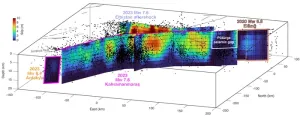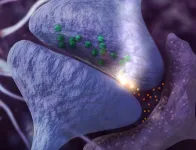Moffitt researchers discover pathway critical for lymphoma development
Hypusine modification of eIF5A is essential for development of MYC-driven lymphoma
2023-04-20
(Press-News.org) TAMPA, Fla. — MYC proteins are important regulators of cancer cell growth, proliferation and metabolism through their ability to increase the expression of proteins involved in these processes. Deregulation of MYC proteins occurs in more than half of all cancers and is associated with poor patient prognosis and outcomes. Numerous researchers have devoted significant efforts to try to target MYC proteins as a therapeutic approach to treat cancer. However, this has been extremely challenging to date, and other complementary strategies are being investigated.
In a new article in Blood Cancer Discovery, which was published simultaneously with a presentation at the American Association for Cancer Research annual meeting 2023, a team of Moffitt Cancer Center researchers demonstrated a possible alternative approach. They showed that MYC activates a downstream pathway that chemically modifies a protein called eIF5A, and that inhibition of this modification process prevents lymphoma development and progression in mouse models.
“Our team hypothesized that rather than targeting MYC directly, it may be possible to inhibit its cancer effects by targeting a protein downstream of the MYC effector protein that is also critical to cancer development,” said Shima Nakanishi, Ph.D., lead study author and research scientist in the Tumor Biology Department at Moffitt. “We focused our efforts on the polyamine biosynthesis pathway that is involved in cell growth and survival and that is hyper altered in many cancers.”
The Moffitt team showed that MYC induces the expression of eIF5A and an enzyme called DHPS that modifies eIF5A with a unique amino acid called hypusine. The Moffitt researchers wanted to test if this chemical modification of eIF5A is important for the development and maintenance of lymphoma. They conducted laboratory experiments with cell lines and mouse models and determined that hypusine-modified eIF5A is critical to the development of lymphomas that are regulated by MYC. When the researchers blocked this modification genetically or chemically by targeting eIF5A or DHPS, lymphoma development and progression were inhibited. Mechanistically, they discovered that hypusine-modified eIF5A was important for the production of proteins responsible for cell growth and DNA replication. This is the first study to conclusively demonstrate that this modification is important to the development of cancer.
“As activation of the hypusine circuit is a hallmark of MYC-driven tumors, the development of improved small molecule inhibitors of DHPS, or of agents that bind to and block eIF5A-hypusine function, are attractive therapeutic strategies for translating these findings into the clinic,” said study author John Cleveland, Ph.D., center director and chief scientific officer at Moffitt.
This study was supported by the National Cancer Institute (CA100603, CA241713, DK124906, DK060581 and P30 CA076292), Cortner-Couch Endowed Chair for Cancer Research from the University of South Florida School of Medicine, Diabetes Research Center (P30 DK020595) and funds from the state of Florida.
About Moffitt Cancer Center
Moffitt is dedicated to one lifesaving mission: to contribute to the prevention and cure of cancer. The Tampa-based facility is one of only 53 National Cancer Institute-designated Comprehensive Cancer Centers, a distinction that recognizes Moffitt’s scientific excellence, multidisciplinary research, and robust training and education. Moffitt’s expert nursing staff is recognized by the American Nurses Credentialing Center with Magnet® status, its highest distinction. With more than 7,800 team members, Moffitt has an economic impact in the state of $2.4 billion. For more information, call 1-888-MOFFITT (1-888-663-3488), visit MOFFITT.org, and follow the momentum on Facebook, Twitter, Instagram and YouTube.
###
END
ELSE PRESS RELEASES FROM THIS DATE:
2023-04-20
April 20, 2023-- A new study by researchers at Columbia University Mailman School of Public Health shows that water arsenic levels are linked to higher urinary arsenic among the U.S. population for users of both private wells and public water systems. The findings are published in the journal Environmental Research.
Long-term exposure to arsenic even at low and moderate levels can increase the risk of cancer and other types of chronic disease. While drinking water along with diet is a major source ...
2023-04-20
(Toronto, April 20, 2023) Storing donor lungs for transplant at 10 degrees Celsius markedly increases the length of time the organ can live outside the body according to research led by a team of scientists at the Toronto Lung Transplant Program in the Ajmera Transplant Centre at the University Health Network (UHN).
The prospective multicenter, nonrandomized clinical trial study of 70 patients demonstrated that donor lungs remained healthy and viable for transplant up to four times longer compared ...
2023-04-20
Researchers know a lot about Turkey’s next major earthquake. They can pinpoint the probable epicenter, estimate its strength and see the spatial footprint of where damage is most likely to occur.
They just can’t say when it will happen.
That’s the main takeaway from a new USC-led study that appears today (April 20) in Seismica.
Using remote sensing, USC geophysicist Sylvain Barbot and his fellow researchers documented the massive Feb. 6 quake that killed more than 50,000 people in Eastern Turkey and toppled more than 100,000 buildings.
Alarmingly, researchers found that a section of the fault remains unbroken and locked – a sign that the plates there ...
2023-04-20
People with dementia have protein build-up in astrocytes that may trigger abnormal antiviral activity and memory loss, according to a preclinical study by a team of Weill Cornell Medicine investigators.
Dysfunction in cells called neurons, which transmit messages throughout the brain, has long been the prime suspect in dementia-related cognitive deficits. But a new study, published in Science Advances on April 19, suggests that abnormal immune activity in non-neuronal brain cells called astrocytes is sufficient to cause cognitive deficits in dementia. The discovery could lead to new treatments that reduce excess immune activity in astrocytes and their detrimental effects on other brain ...
2023-04-20
Irvine, Calif., April 20, 2023 — Scientists at the University of California, Irvine have made a remarkable discovery about cellophane bees – their microbiomes are some of the most fermentative known from the insect world. These bees, which are named for their use of cellophane-like materials to line their subterranean nests, are known for their fascinating behaviors and their important ecological roles as pollinators. Now, researchers have uncovered another aspect of their biology that makes them even more intriguing.
According to a study published in Frontiers in Microbiology, cellophane ...
2023-04-20
SAN FRANCISCO, CA—April 18, 2023—The human brain has a sweet tooth, burning through nearly one quarter of the body’s sugar energy, or glucose, each day. Now, researchers at Gladstone Institutes and UC San Francisco (UCSF) have shed new light on exactly how neurons—the cells that send electrical signals through the brain—consume and metabolize glucose, as well as how these cells adapt to glucose shortages.
Previously, scientists had suspected that much of the glucose used by the brain was metabolized by other brain cells called ...
2023-04-20
ST. LOUIS – Research published in Regional Environmental Change has shown that as climate zones shift toward hotter and drier conditions, ecological diversity will decline, posing a major threat to terrestrial ecosystems with far-reaching social and ecological impacts.
The study, “Shifting climate zones and expanding tropical and arid climate regions across Kenya (1980-2020),” was published online on April 5.
The research team analyzed Kenya's geographic distribution and arrangement of ...
2023-04-20
In the arid regions of the American Southwest, an unseen world lies beneath our feet. Biocrusts, or biological soil crusts, are communities of living organisms. These industrious microbes include cyanobacteria, green algae, fungi, lichens, and mosses, forming a thin layer on the surface of soils in arid and semi-arid ecosystems.
Biocrusts play a crucial role in maintaining soil health and ecosystem sustainability, but they are currently under assault. Human activities including agriculture, urbanization, and off-road ...
2023-04-20
The rate of suspected suicide attempts by poisoning among children and adolescents ages 10-19 reported to U.S. poison centers increased 30% during 2021 – the COVID-19 pandemic’s first full year – compared with 2019, a new UVA Health study found.
The rate of suspected suicide attempts by poisoning among children ages 10-12 increased 73% during 2021 compared with 2019. Among adolescents ages 13-15, the rate of suspected suicide attempts by poisoning increased 48.8% in 2021 versus 2019. The rate of suspected suicide attempts by poisoning among females ages 10-19 increased 36.8% in 2021 compared with 2019.
The findings ...
2023-04-20
A collaborative multi-site randomized controlled trial at the University of Houston and the Medical University of South Carolina is set to prove the effectiveness of treating alcohol use disorder (AUD) and posttraumatic stress disorder (PTSD) together.
It’s a one-two punch whose time has come. No integrative treatment combining Cognitive processing therapy (CPT) for PTSD and relapse prevention (RP) for AUD currently exists.
“A substantial proportion of individuals with AUD also meet criteria for PTSD. The co-occurrence of AUD/PTSD is characterized by more severe symptomatology, greater functional impairment, ...
LAST 30 PRESS RELEASES:
[Press-News.org] Moffitt researchers discover pathway critical for lymphoma development
Hypusine modification of eIF5A is essential for development of MYC-driven lymphoma




